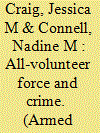| Srl | Item |
| 1 |
ID:
138761


|
|
|
|
|
| Summary/Abstract |
Sampson and Laub’s age-graded theory of informal social control posits that social bonds created through marriage, military, and employment lead to a decrease of criminal behavior or desistance. Most research has focused primarily on the roles of marriage and employment in this process, ignoring the impact of military service on future offending behavior. However, recent US military involvement in the Middle East suggests that the effects of military experience on individuals should be reevaluated. Using data collected from a more recent sample of military-involved individuals, all of whom served in the All-volunteer Force, this study examines how participation in the military impacts offending and potential desistance. The results
demonstrate that, overall, modern-day military involvement does not have the same protective effect on future offending as observed in World War II samples. Racial subgroup analyses, however, suggest that military involvement leads to a greater likelihood of desistance for minority service members.
|
|
|
|
|
|
|
|
|
|
|
|
|
|
|
|
| 2 |
ID:
177005


|
|
|
|
|
| Summary/Abstract |
We build on prior research examining military involvement and criminal involvement by investigating the importance of acquiring the more complete “respectability package” that includes marriage as well as military experience and variations among White and Black respondents. Using data from Waves I and IV of the National Longitudinal Study of Adolescent to Adult Health (Add Health; n = 5,801), analyses use logistic regression models to assess associations of military service, marriage, and race with odds of reoffending among White and Black young adults who reported offending at Wave I. Military involvement was associated with lower odds of offending for Black respondents only, while marriage was associated with decreased odds of reoffending across both groups. Among Black respondents, analyses also highlighted the importance of acquiring both components of the respectability package (military service and marriage) in the context of today’s all-volunteer force in reducing criminal involvement.
|
|
|
|
|
|
|
|
|
|
|
|
|
|
|
|